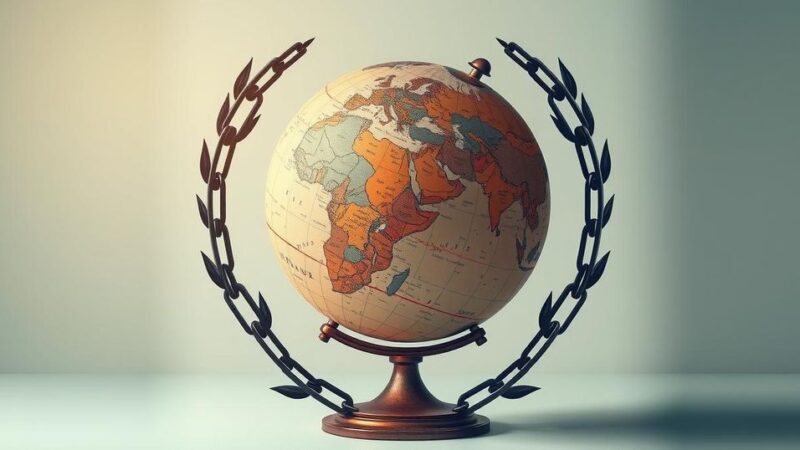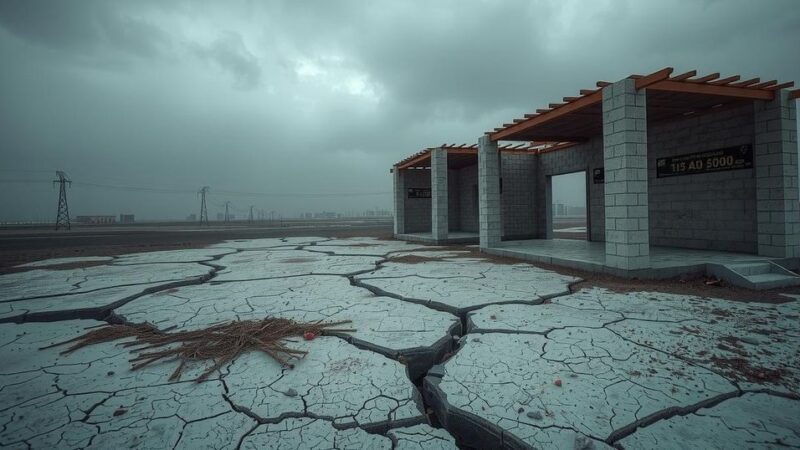UN officials express concern over Libya’s fragile stability, citing longstanding divisions and human rights issues. The appointment of a new UN envoy aims to address the political gridlock and to prepare for national elections. An Advisory Committee has been formed to tackle obstacles to the electoral process, while the situation remains critical with rising instability and threats to the safety of migrants. Urgent international support is essential to address these humanitarian needs and rebuild Libya’s governance structure.
The pursuit of a stable and prosperous Libya remains elusive 14 years post-revolution, as articulated by Rosemary DiCarlo, Head of UN Political and Peacebuilding Affairs, during a Security Council meeting. She highlighted that enduring divisions, poor economic management, human rights abuses, and conflicting interests continue to diminish national unity and stability. Ms. DiCarlo cautioned, “The fragile stability in Libya is increasingly at risk,” emphasizing that the leadership is prioritizing personal and political selfish motives over national interests.
DiCarlo urged the Security Council to support the new UN Special Representative for Libya, Hanna Tetteh, as she works to navigate the political deadlock and assist the Libyan populace in unifying governmental institutions and conducting inclusive national elections. The country has been divided between the internationally recognized Government of National Unity (GNU) in the northwest and the eastern-based Government of National Stability (GNS) for over a decade, with planned elections postponed largely due to candidate eligibility disputes.
Last month, UNSMIL initiated an Advisory Committee tasked with providing recommendations to address the contentious issues stalling national elections. Comprising 20 members, including women and legal experts, the Committee is not a decision-making body but aims to facilitate progress towards elections by addressing impediments. Ms. DiCarlo noted that various Libyan factions welcome this initiative as a vital step towards advancing the political process.
UNSMIL recently convened the Committee’s first meeting in Tripoli to delve into these contentious matters and discuss strategies for resolution. Additionally, the Mission is organizing structured dialogues intended to foster an inclusive vision for Libya’s future, while also consulting economic experts to identify pressing priorities and solutions to enhance economic governance.
The persistent divisions and competition regarding control over state institutions grip the political and economic landscape, with crucial issues like a unified budget still unresolved despite UNSMIL’s continuous engagement. Ms. DiCarlo underscored the necessity of addressing these issues to stabilize Libya’s financial situation and ensure equitable public spending. Furthermore, disputes regarding the presidency of the High Council of State remain contentious and unresolved.
Political division is undermining national reconciliation efforts, with the UNSMIL facilitating agreements among significant governmental bodies on draft legislation intended to promote reconciliation. However, legislators’ amendments to the draft law have sparked doubts about the independence of the proposed National Reconciliation Commission. Earlier this month, a charter for reconciliation was affirmed, although support remains divided among Libyan stakeholders.
The activities of armed and quasi-armed groups continue to threaten Libya’s tenuous stability, prompting calls for a transparent investigation into an attack on a GNU Minister. Ms. DiCarlo noted that the Libyan National Army recently seized a military base from a GNU-affiliated officer, with only partial adherence to the 2020 Ceasefire Agreement.
The pattern of arbitrary arrests and enforced disappearances remains alarming, alongside the troubling rise in deaths in custody, notably affecting migrants and asylum-seekers facing severe human rights violations. The discovery of mass graves related to human trafficking underscores the perilous conditions for migrants within Libya, urging a full investigation into such occurrences to uphold their protection.
In response to the humanitarian crises, UNSMIL has engaged local authorities and community members to bolster support for Sudanese refugees fleeing to Libya. Ms. DiCarlo emphasized the dire need for $106 million to fulfill the demands of the Sudan Refugee Regional Response Plan targeting 446,000 individuals and has appealed for continued funding from international donors.
The ongoing crisis in Libya exemplifies a precarious balance of political instability, economic mismanagement, and human rights abuses, as articulated by the UN. Continuous support for national dialogue and UN initiatives is paramount to restore unity and facilitate national elections. Furthermore, the urgent need to protect vulnerable populations, particularly migrants, and refugees directs the focus toward the necessary humanitarian response and increased global financial assistance.
Original Source: news.un.org






